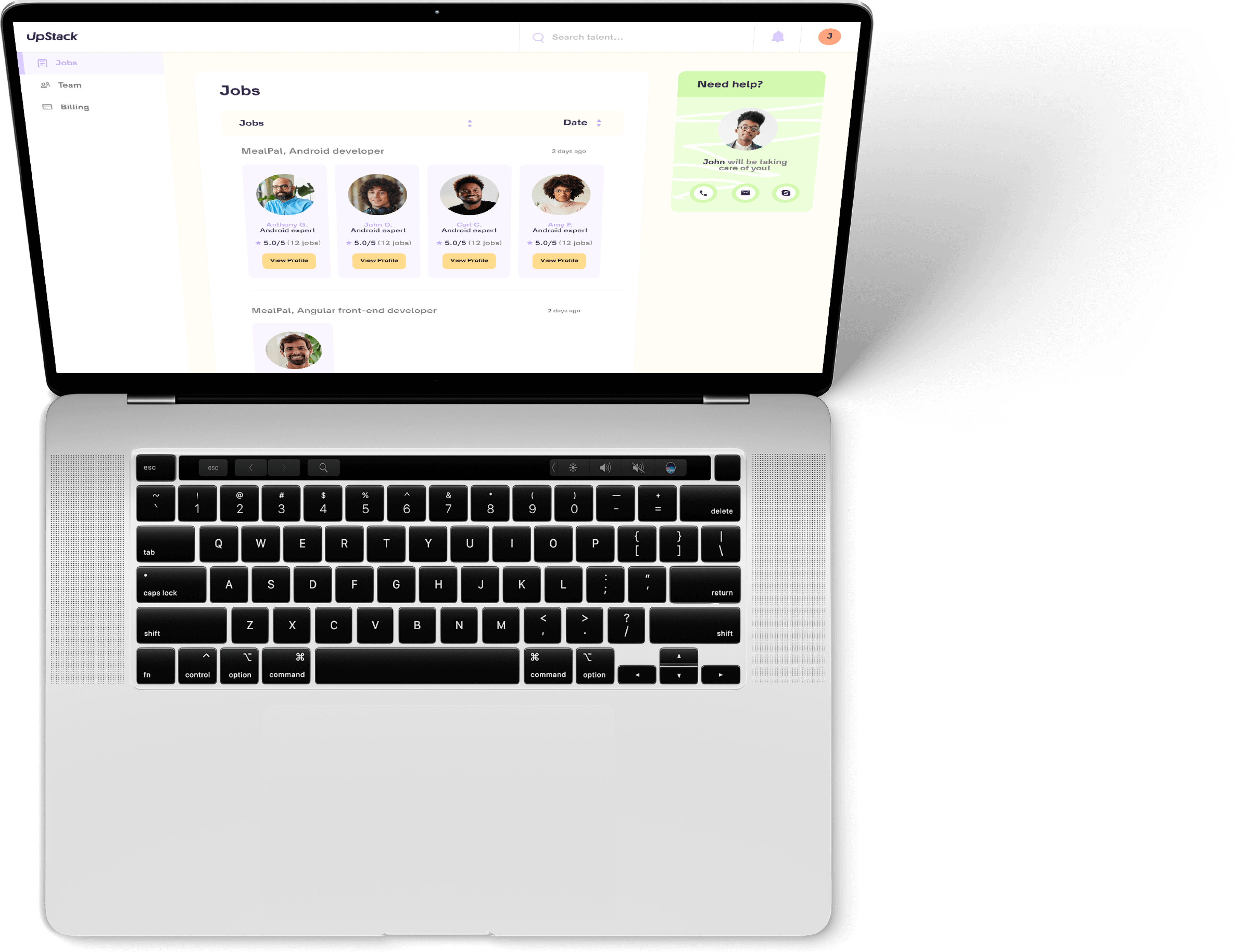


Schedule a consultation & hire an Ionic Developer
Stella B.
Available
Ionic Developer
-
Experienced Ionic engineer with seamless project implementation
-
Loves guacamole & hates spoilers

-
Marcus T.
Available
Ionic Engineer
-
Stacked portfolio of beautiful, functional websites
-
Known for his epic charcuterie & cheese boards

-
David M.
Available
Ionic Developer
-
Mobile engineering guru with a knack for translating stakeholder needs
-
Would rather be diving Palau’s Blue Corner

-
Top UpStack Ionic Developers
Hire Ionic Developers with Upstack
Are you in the process of creating an app? If so, you’ve likely heard of Ionic, a popular open-source software development kit (SDK) for mobile app development. Ionic is a great platform for creating high-quality mobile applications that can be deployed on multiple platforms, like iOS and Android. However, to bring your app project to life, you need the right Ionic developer. Hiring a great Ionic developer can be challenging and daunting, but it doesn’t have to be. With the right roadmap and knowledge, you can find the perfect developer for your app project. This guide will provide you with an essential overview of what to look for in an Ionic developer, as well as tips on how to find the perfect fit for your app project.
What is Ionic and why is it used for mobile app development?
Ionic is a hybrid mobile app framework that allows developers to create mobile apps with a combination of web technologies and native functionality. Hybrid mobile apps are a great solution for companies that want the benefits and functionality of a native app without the time, cost, and effort associated with developing a full-native mobile app. Plus, Ionic apps can be deployed on multiple platforms, including Android and iOS. While Ionic is primarily used as a hybrid mobile app framework, it can also be used to create web applications and desktop applications using popular technologies like Javascript, Angular, CSS, and Sass. Ionic is a great option for creating a wide variety of mobile app projects. In fact, Ionic apps have been used for everything from marketing and productivity apps to SaaS and eCommerce apps. Ionic apps are perfect for mobile applications that require a great deal of interactivity and functionality.
What to look for in an Ionic programmer
You may think that anyone can develop an Ionic app, but that’s not the case. The right Ionic developer will have a strong understanding of the framework and possess the necessary skills to build high-quality apps with it. Take the time to find a great Ionic developer by evaluating their skills, experience, and credentials. This will help you to find a developer who is well-suited for your project and can help you to avoid project mistakes and missteps. Here are a few things to look for in an Ionic developer:
- Strong skills and experience in Ionic and hybrid mobile app development.
- Great communication and interpersonal skills.
- Great project and time management skills.
- Ability to build high-quality Ionic apps.
- Strong technical and programming skills.
- Proficiency in the language(s) used for your app.
- Proficiency in related technologies, like the backend language for your app.
- Desire to build great things and make a positive impact.
- Passion for what they do.
- Proficiency in a programming language(s) used to build the back-end of your app.
- Proficiency in related technologies, like APIs and databases.
- Dedication to continuing education and learning
Tips for interviewing an Ionic developer
It’s important to have a clear understanding of what to look for in an Ionic developer, but it’s just as important to know how to interview a candidate. Here are a few tips for interviewing an Ionic programmer:
- Ask open-ended questions to get a better understanding of what to look for in a candidate.
- Avoid asking yes/no questions that can be answered briefly and don’t give you a wealth of information.
- Avoid asking questions that require technical proficiency.
- Ask candidates how they’ve solved similar problems in the past.
- Ask candidates what they think is the biggest challenge they will face on the project.
- Ask candidates what they think are the biggest advantages of using Ionic for the project.
- Get a sense of the candidate’s personality.
- Get a sense of the candidate’s knowledge and experience.
- Determine if the candidate is a good fit for your team.
Tips for evaluating an Ionic developer
After you’ve found the right Ionic developer for your project, it’s important to evaluate their performance. This will help you to ensure that you have a team of great developers on your project. Here are a few tips for evaluating an Ionic programmer:
- Set clear expectations early.
- Hold regular and constructive check-in meetings.
- Make sure that your team is well-equipped to handle any issues that arise.
- Establish clear and consistent communication channels.
- Set clear and consistent deadlines.
- Have a clear code of conduct and project guidelines.
- Hold one-on-one meetings with each member of your team.
- Make sure everyone on the team has the tools they need to succeed.
- Make sure everyone is getting the guidance and feedback they need to succeed.
- Make sure everyone on the team feels supported and valued.
How to onboard an Ionic developer
You’ve identified the right Ionic programmer for your project, and they’re now on the team. Now what? Now, you need to onboard the developer and get them familiar with your project. Here are a few tips for onboarding an Ionic developer:
- Set up an onboarding schedule.
- Get to know your developer.
- Keep your developer in the loop with project updates.
- Set up a schedule for one-on-one meetings.
- Discuss best practices, coding standards, and development environments with your developer.
- Make sure your developer is getting the support they need.
- Make sure your developer is able to ask questions as they come up.
- Make sure your developer is getting feedback on their code.
- Get your developer involved in the project as soon as possible.
- Make sure your developer has a clear picture of the project.
- Have frequent check-in meetings with your developer.
- Make sure your developer has what they need to succeed.
They trust Our Ionic Developers
Why hire a Ionic developer with Upstack
![Ionic Developer and Programmer Icon]()
Top Ionic talent pre-vetted for a perfect fit.
Our 8-point assessment evaluation ensures that every senior Ionic developer you interview exceeds expectations across technical, cultural, and language criteria.
![Ionic Programmers Computer Icon]()
Hire reliable, passionate Ionic developers.
From late-night sprints to jumping on a last-minute face-to-face, we ensure that your recruits are down to get the job done right.
![Ionic Programmers High Five Icon]()
Risk-free 14-day trial.
Confidently onboard candidates with our no-questions-asked trial period. We’ll walk you through the contract-to-hire process if and when you’re ready to make it permanent with your new Ionic engineer.
![Ionic Computer Programmer Icon]()
Our Client Success Experts provide white-glove service.
Stay laser-focused on your business goals while our team of experts curates potential candidates and manages seamless programmer onboarding.
![Ionic Developer Writing Notes Icon]()
Build your optimal team confidently, quickly.
UpStack handles everything including background and reference checks, legal issues, and more. Our platform streamlines billing, timesheets, and payment all in one easy-to-access place.
Schedule a call with a Client Success Expert to get starting hiring a Ionic developer.
Start hiring Start hiring Start hiring
Hire from the Best.
Working with our Client Success Experts, we’ll help you build the remote team of your dreams with top Ionic talent from around the world.
Pre-vetted, reliable Ionic developers are standing by.





Hiring Ionic Developers | FAQs
How much does it cost to hire a Ionic developer?
UpStack has a simple billing model where each Ionic developer has a standard hourly rate averaging between $65-$75 per hour. Rates are based on skills, knowledge, and experience, and our developers are available mainly for full-time engagement (40 hours per week) and the occasional part-time opportunity (20 hours per week).
What is the process to find a Ionic developer?
You’ll connect with an UpStack Client Success Manager to determine your immediate needs. Our team uses a combination of AI and personal assessment to short-list candidates that match your job requirements. From there, you interview, select, and onboard the perfect developer, all within days of your initial call.
How does UpStack find its Ionic developers?
UpStack’s talent recruitment team connects with software developers around the globe every day. Each Ionic programmer is vetted for technical, communication, and other soft skills necessary for a developer to successfully work with your team. Once vetted, the candidates are accepted into the UpStack developer community.
How is UpStack different from an agency or recruiter?
UpStack's community of available, pre-vetted engineering talent means minimizing roadblocks to scaling your team effectively, efficiently, and immediately. Our Client Success Experts work with you and your UpStack developer to ensure a smooth and seamless engagement.
Can I hire UpStack Ionic developers directly?
Yes, you can hire UpStack Ionic developers at any time, and with the same assurance of smoothly on boarding talent risk-free. First, we’d create a job opening on our portal. Then, we’d vet, interview, and match developers that meet your needs. If you’re satisfied at the end of the 14-day trial period, at any time you can directly hire them.
Common Ionic Questions from Developers and Companies
What is Ionic?
Ionic is a type of framework used for developing mobile applications. It is an open-source framework, which means that it is free to use and developers can contribute to its development. Ionic allows developers to create hybrid mobile apps using web technologies like CSS, HTML, and JavaScript. This means that the same code can be used to create apps for multiple platforms, including iOS and Android. Ionic also provides a number of pre-built components, which can be used to speed up development and create a more polished user experience.
Can ionic be used for web development?
Yes, Ionic can be used for web development. In addition to creating hybrid mobile apps, Ionic can also be used to create progressive web apps (PWAs). These are web apps that can be installed on a user's device and provide an experience similar to a native mobile app. Ionic provides a set of tools and services that can be used to create PWAs, including support for offline access, push notifications, and the ability to add the app to a user's home screen. This allows developers to create web apps that have the functionality and feel of a native mobile app.
How do I develop an android app using ionic framework?
To develop an Android app using the Ionic framework, you will need to have the following installed on your computer:
- Node.js and npm: Ionic is built using Angular, which is a JavaScript framework, so you will need to have Node.js and npm (the Node.js package manager) installed on your computer in order to use it.
- Cordova: Cordova is a framework that allows you to create mobile apps using web technologies like HTML, CSS, and JavaScript. Ionic is built on top of Cordova, so you will need to have it installed in order to use Ionic.
- Android Studio: Android Studio is the official IDE for Android development, and it includes everything you need to build an Android app, including a code editor, a debugger, and an emulator.
Once you have these tools installed, you can create a new Ionic project by running the following command:
Copy codeionic start my-app
This will create a new Ionic project called "my-app" in a directory with the same name. To run the app on an Android emulator, you will need to add the Android platform to your project by running the following command:
Copy codeionic cordova platform add android
You can then run the app on the emulator by running the following command:
Copy codeionic cordova emulate android
This will launch the emulator and install the app on it, allowing you to test and debug your app. When you are ready to create a release build of your app, you can run the following command:
Copy codeionic cordova build android
This will create an APK file (the file format used for Android apps) in the platforms/android/app/build/outputs/apk/ directory of your project. You can then sign this APK file and publish it to the Google Play Store or distribute it to users through other channels.
How much does an Ionic developer make?
Ionic developers typically earn salaries in the range of $60,000 to $110,000 per year, depending on their experience and location. This is just a rough estimate, and actual salaries may vary depending on a number of factors, including the size and location of the employer, the developer's level of experience, and the demand for Ionic developers in their area.
Can I use Python in Ionic?
Ionic is a framework for building mobile apps using web technologies like HTML, CSS, and JavaScript. It is not directly compatible with Python, which is a programming language that is typically used for building server-side applications and utilities. However, it is possible to use Python in combination with Ionic in certain ways. For example, you could use Python to create a RESTful API that your Ionic app can communicate with in order to retrieve data or perform actions on the server. This would involve setting up a server-side Python application that your Ionic app can make HTTP requests to, and then handling those requests and returning the appropriate data or performing the requested actions. This is just one example of how you could use Python in combination with Ionic, but there may be other ways to do so depending on your specific requirements and use case.















